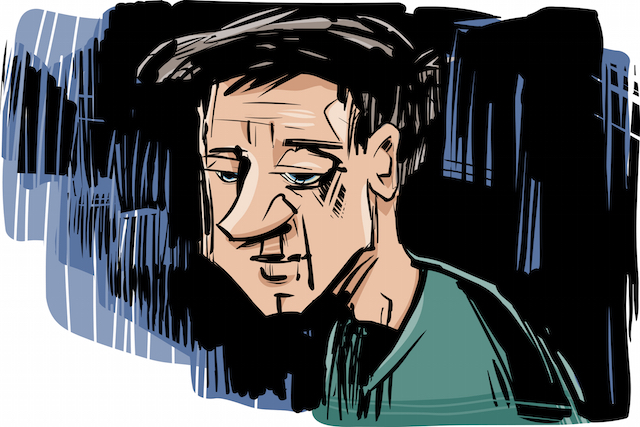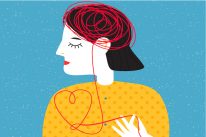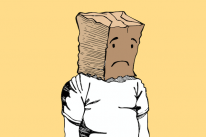
“People are doing the best that they can from their own level of consciousness.” ~Deepak Chopra
My father passed away suddenly and not so suddenly several weeks back.
He had been sick for a long time, but it was a gradually progressing illness and not what ultimately caused his passing. So, it did come as a shock, and the last few weeks have been filled with all the random things you need to do when someone dies—change the names on insurance policies and automobile titles, call social security, etc.
The list seems endless, but now that the tasks are winding down, the silence that is settling in is leaving both my mom and I alone with our feelings.
I knew this silence would come, and I dreaded it. I was afraid I’d think terrible thoughts about him, and that in turn would make me feel like a terrible person. It’s a long story…
There’s no sugarcoating it: My dad was not a great father to me. He provided for our family and didn’t do drugs or drink. He bought us nice presents for the holidays. He did teach us a healthy respect for the rules. He also made it very clear he had a favorite child, and it wasn’t me.
He wasn’t affectionate to me, and he once told me as a child that he wasn’t interested in me as a person because I wasn’t interested in what he liked to do, and he followed through with that by withdrawing from participation in my various childhood pursuits. He occasionally, though not often, beat me with his hands and objects.
Nothing I did ever seemed to please him. When I got a job in addition to taking a full suite of university courses in high school (I was the only child of four who did that), he said I didn’t make enough money.
When I got into the university of my choice (an elite one), he said I should have chosen a secular school, and the one and only time he visited (it wasn’t too far from our house), he said it was “full of crosses.” I cannot remember him ever saying he was proud of me.
He was rarely affectionate with me, and he was loath to comment on my successes while he frequently reminded me of my failures and, above all, the expense I was costing him. The list of the scars I bear from my relationship with him could go on and on and on.
So, though I have always had a problem with the phenomenon of people being beatified when they pass away, I feared not responding to his passing with compassion and instead being accosted by negative thoughts and feelings about him during the silence that followed.
Silence of course invites in the ego, that often very negative voice in the head. I feared feeling and acting like an insensitive, ungrateful person and wondered how I would feel if my own family thought such things about me if I died.
Like so many times when we face a spiritual test, I surprised myself. Once the initial shock and overwhelming grief I felt passed, I found that my disposition toward him was surprisingly kind.
First and foremost, I just feel sorry for him—he suffered for a long time and died too young. Beyond that, I feel grateful for having him as a father because I know he did his very best, and I recall that as perhaps the most important lesson he taught me years before: people are always just doing the best they can.
This lesson is a very difficult pill to swallow. Most everyone knows lying and stealing are wrong, and yet so many people do them anyway. Violence and aggression are among society’s universally believed wrong, and yet our world has way too much of them. In the grip of feeling oppressed or victimized, it’s almost impossible to hold this thought in our head—we’re too logical for that.
But consider for a moment: That lady in the store knew that hurling invective at the cashier who couldn’t figure out the correct coupon code is impatient, unkind, and probably unreasonable. The guy on the road who cuts people off knows he doesn’t like it when people do that to him, and he knows his actions make a road accident more likely. They do it anyway. How can we even think they’re doing their best?
One way is to think about it very cleanly: What would you say about someone who knows something to be wrong and yet cannot summon the self-control, patience, compassion, or whatever it may be to stop themselves from doing it?
In that moment, the person is not conscious enough to refrain from the hurtful action. The person is not connected enough to identify with those his or her actions are harming. Something is holding that person back from showing up fully and achieving his or her full human potential for goodness.
The maddening fact for those of us who skew to the hyper-logical side of the spectrum is that in 99.9% of cases, you’ll never know what that something is. In fact, no matter how well you know someone, the best you can do in terms of understanding his or her motives, subconscious thoughts and emotions driving behavior is an educated guess.
However, I knew my dad as well as he allowed anyone to, and I was very familiar with his personal history, so I had a pretty good idea what those somethings holding him back were.
He grew up in an abusive household, and his dad eventually abandoned his mom and him. He was poor. He lived in a tough inner-city neighborhood and was bullied terribly as a child.
His mom was a cold and distrustful woman with few if any friends and estranged from almost her entire family. She relentlessly hounded him about his every dollar of expense.
Not surprisingly, he carried the pain of this upbringing with him throughout his whole life, and he had no example of what good parenting looked like.
Without that example and with all the wrong lessons and accumulated pain he carried, is it any surprise Dad had difficulty expressing affection?
Given how little positivity and support he had growing up, how would he have known how to or even that he should have expressed those things to his family? With his mom being estranged from so many people, how could we not expect him as a child to have learned this as a normal state of affairs?
Indeed, he struggled to improve on key parts of what was lacking in his childhood. He was singularly focused on materially providing for all his children—even after he strongly established his financial security—because he knew what it was like to be without material well-being.
Though he definitely was abusive to me at times, this was something that was not a normal state of affairs in our household the way it was in his. Thus, the ways in which he was traumatized most reflected in his parenting, in some way for the better and in some for the worse. It must have been difficult for him.
I can’t say that this realization came easily to me. It took time and distance and only came to me after I had left home for years, during which my time personal hurt gradually faded.
As my life began to fall into place literally on the other side of the world, I saw from afar all the dysfunction unfolding in my family. Not only did I realize that I should be thankful I was removed from it, but I understood it was the best they could do.
As an outsider in the family, I had observed the various inter-personal dynamics at work, and I could identify with how powerless and ill-equipped Dad must have felt to deal with all of it.
This understanding gave me such peace and even empathy, and it freed me from my youthful anger and resentment toward them. Nevertheless, it was only years later when I had my own spiritual awakening that I fully understood the implications, universal applicability, and power of this lesson.
But the truth is that you’ll never know most people that well, and even if you did, you may never even think you understand the ways in which they’ve been damaged. Some of the most unfortunate people are against all circumstances among the most joyful, while many of the wealthiest and most popular celebrities are miserable and lead tumultuous lives.
The mind and the ego are capable of creating their own narratives, which their hosts typically completely identify with. We can never fully understand, but that’s just it—people themselves are rarely aware of their reasons for doing what they do and feeling what they feel.
And there it is: People’s level of consciousness—their awareness of their own feelings and mind (i.e. their ego), as well as those of the people around them—determine how well they can see their own actions and behave with grace.
Dad had a lot of accumulated pain, which had never been given voice, and he didn’t even realize it to be able to strive for better. What he did realize, for example the insecurity of poverty, he tried mightily and indeed succeeded in improving upon.
Likewise, when I beat myself up for responding to others’ plight with coldness and distance, I need to remind myself that this was the model I had growing up, and unless an outside observer was really familiar with the dynamics of our family, there’s no way he or she would understand that about me.
When I feel shame at failing to recognize others’ efforts and accomplishments, I need to remember that’s how I was raised. This was the next step I made after my spiritual awakening—I was able to broaden the whole “they’re doing their best” lesson to myself and others.
And now the next step—the most challenging one—is to try and remember this each and every day.
When faced with that lady yelling about the coupons or the guy who just cut you and four other people off as he sped down the highway, in the midst of your indignation, can you take a breath and remember that they’re doing their best?
How do you know if that lady is maxed out on her credit cards or has a sick husband or just lost her job? Perhaps the angry driver is rushing home to see his sick son or has an anxiety disorder. Whatever the circumstances—and in these cases you’ll never know what those are—that is quite simply the best they can do in that very moment.
When your coworker takes credit for your work and tries to hide it from you, can you accept that she’s operating from a place of pain or fear and that you will likely never understand what exactly that looks like?
Knowing that the coworker is still doing his best doesn’t mean you can’t respond appropriately to right the situation, but can you do so from a state of compassion and not anger? If you can summon the empathy to do so, you’ll likely realize how much more effective your response will be.
So, though it may annoy you to no end, you’ll never know how people process their own past and how that past is expressing itself in the present. In the grip of a terrible situation when you just want to wring someone’s neck, try to remember that. Moreover, when you find yourself remembering, give yourself credit. You may surprise yourself, as I just did with my father’s passing.
I’m still grieving and will be for some time. The pain and fear my dad felt for so long… it just isn’t fair. He didn’t deserve that, just like I didn’t deserve my lonely childhood.
None of us deserve what happens to us, right? We’re born innocent, and yet we all suffer through a lot, whether that be physical or emotional—totally in our own heads. Just try to remember that—we’re all in this together.
Thanks, Dad for teaching me that lesson to live by, and so long.
About Joshua Kauffman
Joshua Kauffman is a recovering over-achiever and workaholic. Leaving behind a high-powered life in business, he has become a world traveler, aspiring coach, and entrepreneur of pretty things. Amateur author of a recent memoir Footprints Through The Desert, he is trying to find ways to share his awakening experience, particularly to those lost in the rat race like he was.













 Though I run this site, it is not mine. It's ours. It's not about me. It's about us. Your stories and your wisdom are just as meaningful as mine.
Though I run this site, it is not mine. It's ours. It's not about me. It's about us. Your stories and your wisdom are just as meaningful as mine.
This article is amazing! I have been recently coming to some of the same conclusions. I had an epiphany while on the road recently when someone cut me off and I started to fall into my typical angry response, “what if I respond with kindness? It will keep me from ruining my day over something so trivial. The other person is likely in their own world and completely unaware of the anger they’ve caused anyway.” By responding with kindness I might make another persons day a tiny bit better, but I will definitely make mine better.
I love this. However I was the victim of general hatred from my father for 32 years of life….until I stopped talking to him. All I can see is an angry face in mine, and all I hear is beration and screams. I can forgive everyone else in my life and the wrongs they’ve done, but I often wonder if he will die while we don’t speak, and right now self preservation makes me apathetic.
Accepting that was the terrible best your dad could do and forgiving him does not necessarily entail any sort of action – it’s purely internal. You can forgive a murderer, but that doesn’t mean you’d want to meet him or her. With your father, maybe it’s best (for you and/or him) that you don’t speak…no one can answer that question but you. Just do your sincere best to answer that question according to the principle of doing the least amount of harm to yourself, to him and to the world.
I absolutely love this post and can relate to it so much. The way people speak and act is a direct reflection of the environment they are in. It has always been hard for me to grasp the concept that people behave differently because it is all that they have ever known and most likely what they expose themselves too. I always try to put my best foot forward in situations like that and remind myself to be the change I want to see in the world and to lead by example.
What a wise and compassionate post! I have rankled at the casual “people are doing their best” claim for the reasons you present, but the context you provide makes it easier to consider: that “best” means “best” given their current capacity and consciousness. When I apply this to myself, though, I have to concede that seeing this truth opens the possibility of doing better. Which kind of leads me back to doubting that people are always doing their absolute best. 🙂 Still, a very helpful post. Thank you.
Hey Cate, thanks!
What I would say is that when you apply this to yourself, you are reaching a deeper level of consciousness than previously, when you acted out in ways that were less than perfect. So, you got better. However, either way you were doing the best that you could do at that particular time. After you got insight, then you did better.
You are kind, Josh, and this is an interesting thought. I am not entirely convinced.only because I have been conscious — in the moment, in certain circumstances — of taking an easier path or making a more harmful choice than I might have. I do think there are such things as cowardice or laziness, realizing, of course, that one could alternately look at our “best” at that moment as not containing the courage or work ethic we later wish it had. For myself only, I want to be careful not to rotely assume “I was doing my best” when it may be an excuse rather than an honest assessment. Even in such instances, of course, it seems important to be kind rather than harsh to oneself.
Amazing post Josh. Really connected with me. I’m sorry for your loss.
My deepest condolences to you and your family. Thank you so much for sharing your story and wisdom. I went through my own bit of awakening with my father as well. It is bizarre to me that I found myself understanding my father and why he behaved the way he did based on his own difficult upbringing, yet didn’t apply it to strangers who behave badly. I guess because my father was my father (family) and I knew I needed to free myself, so I allowed myself to better understand him. It is incredible you have applied this principle to everyone and it makes complete sense. Thank you for your insight. I know I will apply this knowledge more now with all not just family and friends.
Thanks so much H B. It is a challenge even for me, but it sounds like you went through a similar process and I did. I knew my family and hence with distance was able to realize this principle from dealing with them. However, it was a real “Aha!” moment when I saw how it applied to people in general. Like consciousness itself, it’s a daily effort, and I do from time to time lose it. Always a work-in-progress with these spiritual quests.
Thank you, Joshua.
You are a wonderful human being, Josh. My deepest condolences to you.
Great insights Joshua. I am fortunate to have the ultimate in loving parents (I joke our family are dysfunctionally close!), but this perspective you have shared is a great reminder for me in those painful relatings with others where confusing and hurtful responses leave unresolved loose ends that there are always factors we can’t see and the lesson is always give more love and nurture self with healthy boundaries. SO not overthinking THOSE situations anymore. Thanks for the freedom thought train!
I’ve always loved my sister. She’s two and a half years older than I am and I’m 71 years old. Our mother favored her and apparently didn’t think I was a smart or as good at anything as my sister. After we were grown I went back to visit our mother roughly once a month. She got to know my husband and our daughter. We shared many great moments together. I still had the feeling that I was not quite as high in her love as my sister. Meanwhile, Sis had deserted Mom. I’m the one who really got to know our mom and who had the pleasure of companionship that my sister spurned. A few years after mom died my sister got very mad at me and cut off all contact even though we live just a few miles from each other. When I knew I’d never have to deal with her again I felt so light that I almost thought I was rising off the ground. She lives her life and I hope it’s a very good life. I know that she has three very loyal friends. I live my own life with my husband and it’s a life filled with blessings. We’re close with our adult daughter. I still think of my sister though, and I hope she is well and happy but I’m still glad we aren’t in contact.
Yes, sometimes the best thing according to the “do no harm” principle (or often, “do the least amount of harm”) is to not be involved with each other, sad as that may sound. For me, I had to make that decision with a family member as well. If he were to reach out to me, I would gladly accept. However, I believe that until he works out his emotional issues towards me (or more rightly said, his own emotional issues which he directs at me), nothing good will come of me trying to integrate myself into his life.
Heart touching, such an honest writing, thank you for . We will remember 🙂
Can relate to this so much. Thank you for sharing.
I remember reading a book by Brene Brown, and it covered the idea of people are doing the best that they can … no one was born to be angry, its a delusion of the mind, its a sickness. When you apply this thinking to each day it takes away a huge amount of anxiety.
All the best.
“Knowing that the coworker is still doing his best doesn’t mean you can’t respond appropriately to right the situation, but can you do so from a state of compassion and not anger? “
I find this particularly powerful. My attempts to employ such a mindset have proven beneficial.
Ajahn Brahm has said people are doing the best they can, which makes perfect sense, at least when they have generally positive intentions. Most of us don’t screw up on purpose.
As for those with negative intent, this quote seems fairly reasonable, though not universally applicable: “No man chooses evil because it is evil, he only mistakes it for happiness, the good he seeks.” Mary Shelley (from Criminal Minds show)